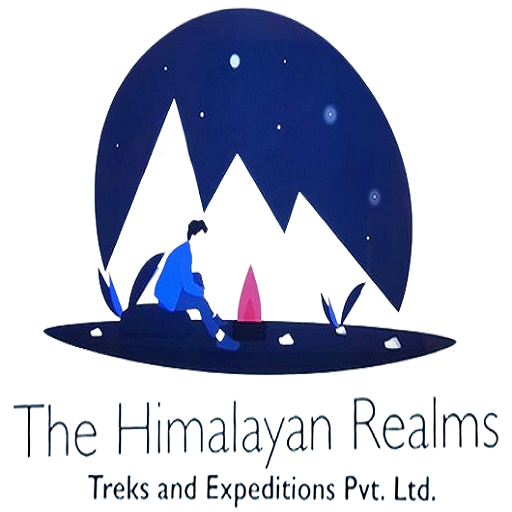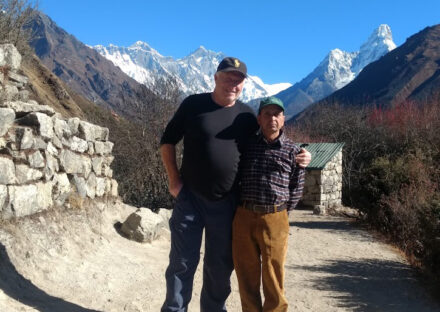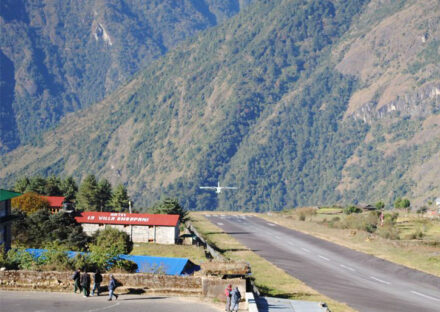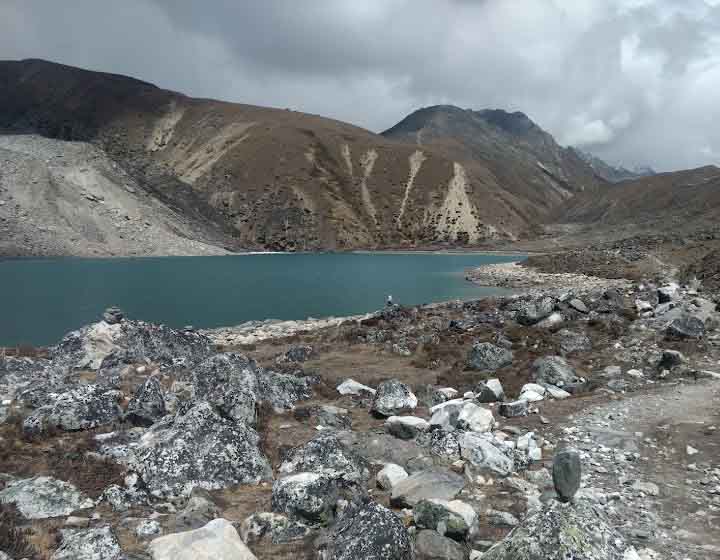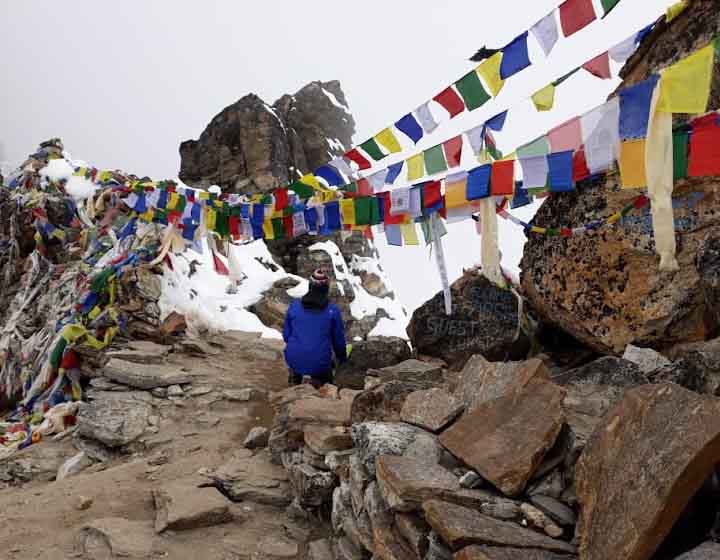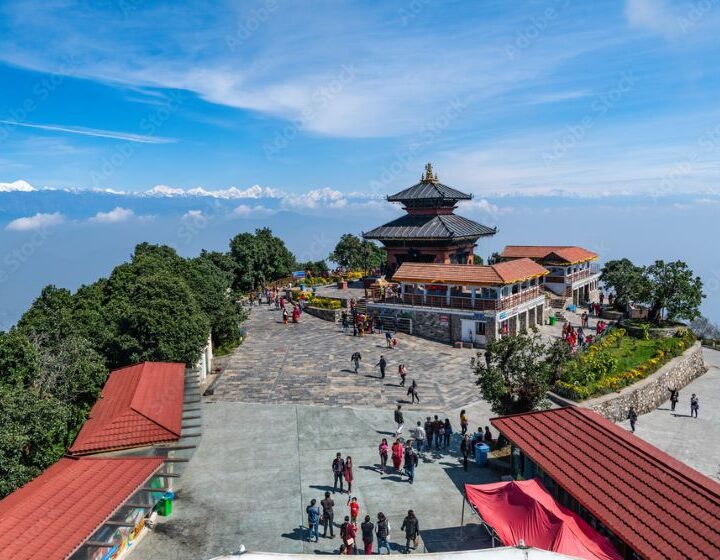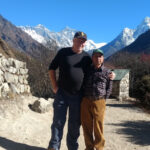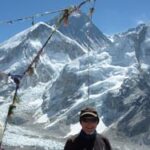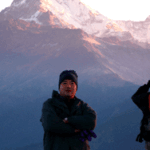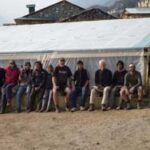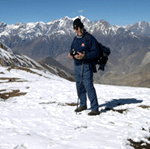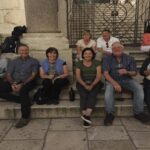
Trip overview
Chukung Ri & Everest Base Camp (EBC) Trek, 13 days
The Chukung Ri & Everest Base Camp (EBC) Trek is a thrilling adventure across Nepal’s breathtaking Khumbu region. This walk offers stunning vistas of several of the world’s tallest peaks, including Everest, Lhotse, Nuptse, and Ama Dablam. Moreover, the breathtaking scenery enhances the overall trekking experience. It’s the perfect combination of cultural exploration, high-altitude trekking, and breathtaking Himalayan scenery.
Chukung Valley: A High-Altitude Gem
Chukung Valley is a stunning high-altitude valley in Nepal’s Khumbu region, wedged between the well-known Everest Base Camp (EBC) route and the Imja Valley. It serves as a starting point for hikers and climbers trekking to Island Peak (Imja Tse, 6,189 m) and Chukung Ri (5,546 m).
Geographical Features: •
Chukung Valley, surrounded by Lhotse, Nuptse, Ama Dablam, Makalu, and Baruntse, is shaped by glaciers from Lhotse. The Imja Glaciers create a rugged, stony landscape with patches of grass and small streams. This valley serves as a crucial acclimatization stop before Island Peak or Everest Base Camp, offering a quieter alternative to Gorak Shep and Lobuche. Climbers can reach Island Peak Base Camp with a short hike.
Chukung Ri (5.546) is the best viewpoint in Khumbu, providing breathtaking 360° views of Everest, Lhotse, Makalu, Nuptse, and Ama Dablam. Unlike other trekking peaks, it requires no technical climbing, making it ideal for adventurous trekkers. Local cuisine includes dal bhat, Sherpa stew, tsampa, yak cheese, and Tibetan bread. Cultural highlights feature Mani Rimdu, Dumji, and Lhosar festivals, adding a rich traditional experience to the trek.
Side trips: side trips and extensions include a hike up Nangkartshang Peak (5,083 m) from Dingboche for acclimatization purposes.
Island Peak Base Camp provides climbers with more mountaineering experience.
Gokyo Lakes Trek: An attractive option to the EBC route.
Kala Patthar (5,545 m) offers the best sunrise views of Everest.
Spring (March-May) is the best season to trek because of the blooming rhododendrons, warm temperatures, and bright skies.
Best season for trekking:
Autumn (September-November) provides the best visibility, with consistent weather and pleasant daytime temperatures.
3. Winter (December-February): cold, but gives isolation with fewer hikers.
Monsoon season (June-August): Expect heavy rainfall, muddy trails, and foggy vistas (not recommended).
Vegetation in Chukung Ri & Everest Base Camp (EBC) Region
The Chukung Ri and Everest Base Camp trek passes through diverse vegetation zones, ranging from lush forests at lower altitudes to barren alpine landscapes at higher elevations.
Lower Elevations (2,500 m–3,500 m)
Dense forests of rhododendrons, pine, fir, and birch. Juniper and bamboo groves in valleys. Rich undergrowth with ferns and mosses
Mid-Elevations (3,500m – 4,500m)
Shrubs like dwarf rhododendrons and juniper bushes. Alpine grasses and medicinal herbs. Small flowering plants, including edelweiss and gentians
Higher Elevations (4,500m – 5,500m: Chukung & EBC)
Sparse vegetation due to extreme cold and rocky terrain. Mosses, lichens, and hardy grasses. Isolated patches of dwarf shrubs in sheltered areas
The gradual change in vegetation reflects increasing altitude and harsh climatic conditions, offering a unique trekking experience through Nepal’s diverse Himalayan ecosystems.
Highlights: Scenic flight from Kathmandu to Lukla.
Trek. Visit Namche Bazaar, the thriving Sherpa capital.
Explore Tengboche Monastery, the most important Buddhist monastery in the area.
Hike to Everest Base Camp (5,364 m) and stand at the base of the world’s highest peak. Climb Chukung Ri (5,546 meters) for panoramic views of Everest, Lhotse, Makalu, and Island Peak.
Similarly, Himalayan Realms Treks offers a wide range of trekking routes in the Everest region, including both classic trails and off-the-beaten-path adventures. Moreover, these routes cater to trekkers of all skill levels, from beginners seeking a short and scenic trek to experienced hikers looking for a challenging expedition. In addition, the breathtaking landscapes, diverse cultural experiences, and well-established trekking infrastructure make the Annapurna region an ideal destination for adventurers. Below are some of them for your information.
6. Gokyo lake with Renjo-la pass trek
Short Itinerary
day 01: Arrival Kathmandu
Day 02: Fly to Lukla, then Phakding
Day 03: Phakding to Namche Bazar
Day 04, rest day for acclimatization.
Day 05: Debuche to Dingboche
Day 06, Dingboche—rest day for acclimatization
Day 07: Dingboche to Chukung
Day 08, Chukung to Labuche
Day 09, Labuche to Gorekshep
Day 10, Gorakshep to pheriche
Day 11: Pheriche to Namche
Day 12: Namche to Phakding
Day 13: Phakding to Lukla
Day 14: Lukla to Kathmandu by flight.
Itinerary
Fly from Kathmandu Airport to Lukla Aiport for about 30 minutes. Then, meet all the trekking assistance in Lukla have tea, coffee in the hotel and make all the backpacking and continue trek to Phakding about 3 hrs. The trekking route is a small ridge from where one goes to the Surke and pass below to Chaurikharka. We pass to the field and keep continue to the Thodokoshi about 2 hrs. When we reach Thadokoshi and have lunch. After lunch keep continues the phakding about 1:30 minutes. Stay overnight in Phakding at the teahouse lodge.
After breakfast start walking, today we are walking so beautiful area through marvelous Rhododendron, Magnolia and Fir forest and several Sherpa villages offer welcome teashops and increase of snow peak of Mountain views and finally, we reach Namche Bazar. Namche Bazar is the main touristic area in the Khumbu region and also main shopping center so after lunch surrounding the market area and stay overnight at Namche Bazar in the lodge.
Rest day for acclimatization. After breakfast climb up to Sherpa museum and see the Mountain Everest, Lhotse, Lhotse Shahar, Ama Dablam surrounded Syangboche, Khumjung and to Namche stay overnight at same hotel.
After breakfast start continues trekking lead to Fungi Thenga about 3 hrs lunch at Phungithenga. After lunch climbing up another 2:30 minutes and reaches to Tengboche. From Tengboche, if the good weather we are able to see Mountain Everest, Lhotse, Lhotse Shahar, Ama dablam, Thamserku and many show peaks. Visit Tengboche Buddhist monastery with your guide and descend about 25 minutes to reaches Debuche. Stay Overnight at Debuche in the teahouse.
After breakfast, we continue our trekking we following the Dudhkoshi river about 1 hrs and cross the suspensive bridge and start to up about 1 hrs and reach Pangboche. Pangboche village where what is we can see the Yeti head in the monastery rest couple of minutes and with tea, coffee and continue toward Somare (4100m) lunch at Somare. After Lunch, it is not easy to walk route because after 1200 this area is windy to continue to Dingboche about 2 hrs. Stay overnight at Dingboche in the teahouse.
After breakfast climb to the Thatcher peak about 2-3 hrs. to make acclimatization
Trek from Dingboche to Chhukung (4,730m). The trek is about 3-4 hours long and is relatively easy.Chhukung is a small village located at the foot of Chhukung Ri. Stay overnight at a guesthouse in Chhukung.
Wake up early and climb Chhukung Ri (5,550m). The climb is challenging but offers stunning panoramic views of the Himalayas.
After reaching the summit, descend back to Chhukung.Abter Breakfast trek to Labuche (94900M) Stay overnight at a guesthouse in Labuche .
After breakfast, the trail goes to the Labuche pass its take about 2 hrs. After Labuche pass the trail is gradual up then we following glacier to Gorakshep about 2 hrs. This part is providing for all the tourist marvelous views of Everest, Pumori, Lola, Kalpather, and Everest Base Camp. After reaching Gorakshep and check in the hotel and lunch. After Lunch goes to Everest Base Camp and back to the Gorakshep. Stay overnight at Gorekshep in the teahouse.
Everest Base Camp is the main camp for the Mountaineers situated at the elevation of 5,364 meters. The Trekkers feel very happy to reach there as it makes them a lifetime memory for their adventurous fulfillment.After breakfast back to Pheriche.
descending till Pangboche and cross the Dudkoshi river and lunch in the Devuche after lunch ascending about 45 minutes till to the Tengboche after down to phungithanga about 1:45 and cross the again Dudkoshi river and start to climbing 1 hrs reach to the Kyanjungma after Kyanjumna to Namche is gradually flat about 2 hrs. Stay overnight at the Lodge in Namche.
After breakfast start to descending about 1 hrs to a dhud Koshi river and cross the suspense bridge. Dudhkoshi River to Jorselle is about 1 hrs follow the riverside of Dudh Koshi and reach Jorselle before Jonelle also we need to cross again the suspensive Dhud Dhudh Koshi bridge and reach to Jonelle there has tea, coffee and continue to the Namche Bazaar. After tea, coffee accents a few minutes and cross the bridge of Dhudkoshi and start to up till national park office at Monju village than all the up and down about 2:30 reach to Phakding. Stay overnight phakding in the teahouse.
Phakding to Lukla about 3 hrs.: - slowly walking distance.
From Lukla to Kathmandu by flight approximately 30 minutes about the flight. From Kathmandu, domestic airport transfer to the hotel and day time is rest and visit Thamel area for a souvenir to your family.
today is free or last minute you have few hrs. special shopping for your relatives. If you have more time you can do some shopping or sightseeing then we will drop you to the International airport to catch your flight back to your home and wish for your Safe journey.
Included
- All airport and hotel transfers
- 2-night hotel in Kathmandu with B/B plan.
- National Park permit & Pasang Lhambu village entry permit.
- Flight fare from Kathmandu-Lukla-Kathmandu.
- Accommodation in the tea house, During the trek.
- Food:- Breakfast, Lunch, Dinner and Tea/coffee during trek.
- Guide: – including salary, insurance, equipment, flight, food and lodging.
- Porter: – including salary, insurance, equipment, food and lodging.
- For guest: -Down jacket, Good sleeping bag (down jacket and sleeping bag are to be returned after trip completion).
- Transfer from airport to hotel in Kathmandu
- All government and local taxes.
- Final departure from hotel to international airport transfer.
Not Included
- Food in Kathmandu ( Lunch & Dinner).
- Bakery food during the trek.
- Nepal Visa fee.
- International airfare.
- Extra night accommodation in Kathmandu
- Travel and rescue insurance if guest get mountain sickness and need to rescue helicopter.
- Personal expenses example (phone calls, laundry service , bar bills, battery recharge, WIFI charge, extra porters, bottle water or boiled water, shower etc.)
- Tips for guide and porters
Join Us Upcoming Trips
Book this trip with us. Here are the upcoming dates. Feel free to share this trip with your friends and family. For custom trips or general inquiries contact us.
| Departure Date | Trip Duration | Price | Status | |
|---|---|---|---|---|
| 10 April, 2025 | 13 days | $2200 | Fixec departure | |
| 10 April, 2025 | 13 days | $05-10-2025 | Fixed departure | |
| 10 November, 2025 | 13 days | $2200 | Fixed departure | |
| 15 October, 2025 | 13 days | $2200 | Fixed departure | |
| 05 October, 2025 | 13 days | $2200 | Fixed departure | |
| 15 December, 2025 | 13 days | $2200 | Fixed departure |
Useful Info
Two major trekking sites in Nepal's Everest region are Chukung Ri and Everest Base Camp (EBC). Here's some relevant information regarding both:
Chukung Ri (5,546 m/18,195 ft)
Overview
Chukung Ri is a high trekking mountain in the Khumbu region, above the hamlet of Chukung (4,730 m) and close to the Imja Valley. It provides breathtaking panoramic views of some of the world's tallest mountains, including Lhotse (8,516 m), Makalu (8,485m), Ama Dablam (6,812m), and Nuptse (7,861m).
Key Highlights:
Best Alternative to High-Pass Trekking: Ideal for hikers looking for a hard climb that does not require technical climbing skills.
Incredible Views: One of the best viewing sites in the Everest region, with close-up views of Island Peak, Ama Dablam, and Baruntse.
Acclimatization Peak is frequently used by climbers training for Island Peak or other Peaks of over 6,000 meters.
To get there, travel from Lukla to Namche Bazaar, Tengboche, Dingboche, Chukung (4,730 m), and Chukung Ri.
Can be paired with the Everest Base Camp or Three Passes Trek.
The finest seasons for trekking are spring (March-May) and autumn (September-November), when the weather is clear and stable.
Everest Base Camp (5,364 metres / 17,598 feet)
Everest Base Camp (EBC) is Nepal's most famous hiking destination, attracting thousands of trekkers each year. It is the starting point for climbers tackling Mount Everest (8,849 meters).
Key Highlights
Kala Patthar (5,545 m) is the greatest viewpoint for Everest because the base camp does not provide spectacular summit views.
Sherpa Culture: Explore Namche Bazaar, Tengboche Monastery, and traditional Sherpa villages.
Glaciers and Icefalls: Close views of the Khumbu Glacier and Icefall are significant. for Everest climbers.
Best Time to Trek: Spring (March–May) and Autumn (September–November) for the best visibility and conditions. Winter (December–February) is possible but extremely cold. Combining Chukung Ri & Everest Base Camp: If you want to trek both Chukung Ri and EBC, the best route is: Lukla → Namche Bazaar → Tengboche → Dingboche → Chukung Ri Return to Dingboche → Lobuche → Gorakshep → EBC / Kala Patthar Descend via Pheriche → Namche Bazaar → Lukla
Difficulty: Moderate to strenuous, with high altitude being the biggest challenge This combination adds an extra acclimatization day in Chukung and helps in better altitude adaptation before reaching EBC.
Essential Tips
Acclimatization is key: Always follow proper altitude gain strategies and take rest days.
Carry appropriate gear: warm layers, windproof jackets, and proper trekking boots are essential.
Stay hydrated & eat well: helps with altitude sickness prevention.
Consider a guide or porter:
FAQs
-
How difficulty Chuhung-Ri Everest Base Camp trek ?
This trek is categorized as difficult due to high altitude, long duration, and technical sections. However, with proper acclimatization, preparation, and guidance from experienced guides, it is achievable for fit trekkers.
-
How to go Chukung-Ri Everest Base Camp trek?
Kathmandu to Lukla by flight then trek to Phakding. we continues to the Chukung-Ri and Everest Base Camp then back to Lukla by same route.
-
How long does it take to climb Chukung Ri?
The ascent and descent can typically be completed in a day, taking roughly 4-6 hours to ascend and 2-3 hours to descend.
-
What are the risks?
Altitude sickness is a significant risk. Proper acclimatization is crucial. Weather conditions can change rapidly. The trail can be challenging to navigate
-
What kind of gear is needed?
Essential gear includes: Warm, layered clothing. Sturdy trekking boots. Trekking poles. A good-quality backpack. A first-aid kit. Sun protection.
